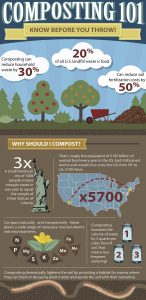- WHAT: This infographic is intellectually stimulating in the way that it presents the benefits of composting. For me, the information about how composted soil retains water better made me think about how we could use compost to aid agricultural regions- such as California- that are experiencing drought. I had not thought about benefits of composting past adding fertile nutrition to soil and reduction of waste so this new benefit was intriguing and stimulating. It took the facts and spun it in a creative way that was relatable to its audience. It put the amount of waste created by American cities in terms of the weight of the Statue of Liberty. This effectively makes the audience think “oh WOW really?” and become more open to what the infographic is saying.
- GUT: I was surprised by many of the facts about household waste in America. We are truly ruining the environment at a horrifyingly quick pace.
- SO WHAT: I had never thought about how composting might make the soil able to retain water better and how less watering accompanied with lower fertilization costs could reduce agricultural costs. This would give motivation for farmers to actively compost. The author of the infographic was definitely trying to inspire people to compost by showing them the amount of waste Americans create and how this waste could create positive effects if composted.
- NOW WHAT: I think our infographic should also include shocking facts put in a relatable way (i.e. no percents that can often be conceptual to the average person. Instead, it should take the data and put it in terms of something people can easily call to mind.) However, this infographic does not properly show the negative effects that result from food rotting in landfills. This information is vital to understanding why composting is necessary rather than just something that would be nice if it happened. Our infographic should show how much waste Americans create, how terrible rotting food waste is for the environment, and then show composting as a necessary step in order to slow down the rate of global warming.
Tag: Vivian Lee-Boulton
Vivian Lee-Boulton Self Portrait
I attended a liberal arts magnet high school that focused on social studies and English and was rather lacking in good science teachers. I took Biology my freshman year. The teacher was very sweet and I did well in it, but I learned very little and remember even less. However in comparison to the next three years of science, that course might have been my favorite science class from high school. Sophomore year I was stuck with a moody soccer coach for chemistry. My AP Physics teacher my junior year was a talented physicist, but had no idea how to teach to anyone without prior knowledge of several years worth of calculus and physics. Senior year I gave up and took Forensics, a joke class, so that I would get my last science credit and graduate, yet I still ended up with a disaster of a teacher.
I am very interested in the outreach portion of this course. As a public relations major, it is important to me to learn the best way to present information to the general public.
I am most interested in the composting portion of the class. My mom has her own garden and compost, but I have never taken the time to learn more about the actual process of how compost is made. I would love to learn more about the process of turning food waste into nutrient-rich soil.
I think that fellow students would be most interested in the reversing climate change portion of these issues. We are all young adults hoping to still have a healthy world to grow old in, and we want to better our environment.
Working with kids in high school could help teach us how to approach these issues in a way that engages younger generations and ensures that people in the future continue to make an effort to improve the environment.

